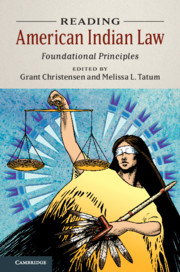Book contents
- Reading American Indian Law
- Reading American Indian Law
- Copyright page
- Dedication
- Contents
- Editors and Contributors
- Preface
- Acknowledgments
- Introduction
- Part I Core Concepts
- Part II Voices
- 5 “Life Comes from It”: Navajo Justice Concepts
- 6 Tribal Court Praxis: One Year in the Life of Twenty Indian Tribal Courts
- 7 Beyond Indian Law: The Rehnquist Court’s Pursuit of States’ Rights, Color-Blind Justice, and Mainstream Values
- 8 A Narrative of Sovereignty: Illuminating the Paradox of the Domestic Dependent Nation
- Part III Property
- Part IV (Mis)Understandings
- Book part
- References
5 - “Life Comes from It”: Navajo Justice Concepts
from Part II - Voices
Published online by Cambridge University Press: 11 December 2019
- Reading American Indian Law
- Reading American Indian Law
- Copyright page
- Dedication
- Contents
- Editors and Contributors
- Preface
- Acknowledgments
- Introduction
- Part I Core Concepts
- Part II Voices
- 5 “Life Comes from It”: Navajo Justice Concepts
- 6 Tribal Court Praxis: One Year in the Life of Twenty Indian Tribal Courts
- 7 Beyond Indian Law: The Rehnquist Court’s Pursuit of States’ Rights, Color-Blind Justice, and Mainstream Values
- 8 A Narrative of Sovereignty: Illuminating the Paradox of the Domestic Dependent Nation
- Part III Property
- Part IV (Mis)Understandings
- Book part
- References
Summary
Life Comes from It': provides a Navajo perspective on law’s origins and its place in governance. Indian conceptions of law are not necessarily bound by a hierarchical premise and by technical principles like stare decisis but instead emerge from the mutual obligations and expectations of the community, with a focus on healing. Yazzie explains that while ‘Anglo’ law is concerned with social control, Navajo law comes from the Navajo belief that all humans are equal, and that starting from a different vantage point allows law itself to be reoriented.
- Type
- Chapter
- Information
- Reading American Indian LawFoundational Principles, pp. 121 - 139Publisher: Cambridge University PressPrint publication year: 2019



